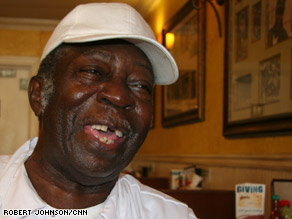Atlantans thank Obama: 'We can become something great'
- Story Highlights
- African-Americans in Martin Luther King Jr.'s hometown say Obama shattered ceiling
- Otis Sutton says Obama did for politics what Tiger Woods did for golf
- Blacks no longer relegated to "shucking and jiving" to get ahead, barber says
- Next Article in Politics »
CNN
ATLANTA, Georgia (CNN) -- The Rev. Martin Luther King is looking down on the United States, smiling, Otis Sutton said Wednesday.

Otis Sutton, 78, recalls how times have changed since he grew up in the segregated South.
"That's what he wanted. He'd been preaching that all along," Sutton, 78, said of the nation electing its first African-American president.
Sutton, who has worked on and off at the historic Busy Bee Cafe in Atlanta, Georgia, since it opened in 1947, was baptized by the civil rights icon's father, King Sr. He remembers playing pick-up football games in a dirt lot with King Jr. when they were both youngsters in Atlanta.
Asked if King Jr. was any good at football, Sutton chuckled.
"He liked to read and study," he said with a reverence that prohibited him from disparaging King Jr. in any way, "but he loved the game."
Walk around Atlanta and you'll find plenty of African-Americans who hope Sen. Barack Obama will inspire young people to reach for a book rather than a football.
"As young, black Americans our society and our communities had told us that the only way we could make it out is if we entertain," said Cortez Tarver, 28, who cuts hair at the University Barbershop, just down the street from the historically black Morehouse College and Clark Atlanta University. ![]() Hear Tarver talk about Obama's win »
Hear Tarver talk about Obama's win »
"They want us to be funny. They want us to cook their food, entertain them and play their sports -- and we do all that, we're just going to fit in."
The media reinforce the erroneous notion that successful black men exist only in the realms of hip hop, football and basketball, Tarver said.
The result is that fewer and fewer African-American children aspire to occupations like doctor and lawyer, he said.
All that changed after Obama locked up the Electoral College vote on Tuesday night.
"Now, they can say they want to be president," Tarver said of young blacks. "This shows us, hey, if we go to college, we study hard, we help out our communities, we can become president, we can become something great -- other than shucking and jiving, other than putting on a show."
Don't Miss
Sutton likens Obama's rise through the political ranks to Tiger Woods' rise through professional golf. Until about 12 years ago, when Woods turned pro, it was rare to find black youngsters swinging clubs at their local links. Even if they had the natural skills, they did not believe the game belonged to them, he said.
"You never seen black children playing golf till [Woods] started playing," said Sutton, explaining that even his 7-year-old grandson, Josh, now enjoys playing golf.
What Woods did for golf, Sutton said, Obama has done for politics. Children across the nation were told Tuesday night that they, too, can aspire to the highest office in the land.
"If he can do it, they believe they can do it," Sutton said.
Back at University Barbershop, Tarver's colleague, Spot Jackson, 28, said the only thing keeping him awake was some Burger King coffee and a few doughnuts after staying up until 6 a.m. watching election news.
Like Tarver and Sutton, Jackson said he believes Obama shattered the ceiling for black men and women. He joked that Obama's victory made him want to start a foundation. Its mission would be simple, he said.
"We're going to eradicate the word 'can't.' We're going to try to get it out of every dictionary known to man," he said. "There's nothing you can honestly say you can't do anymore; it just changes your perception as far as what you think is possible in this country."
Jackson dismissed a question about whether the change was made possible by Obama's skin color, saying it was more about the man's character and platform.
"He could've been green and if the message was the same and it resonated the same way it did, then he still would've gotten the same support," he said.
Jackson said he saw television footage of people in Indonesia celebrating the U.S. presidential election, something he's never seen in the 10 years he's been voting.
Morgan Blanchard, 20, a junior at Clark Atlanta, said she also was impressed to see international footage from Italy and Australia of people celebrating the election. It shows Obama has broad appeal, which speaks more to his honesty and principles than to his skin color, she said.
"Oh gosh, it's not even that he's African-American," she said, noting with a sly smile that Obama's mother was white. "It's the way he carries himself, the way he puts himself out there. I don't think race has anything to do with it."
Her sentiments were echoed by fellow Clark Atlanta student Ashante Smith, 18. A sophomore studying music, Smith said many African-Americans voted for Obama because of his race, but she pointed out that he also snared millions of votes in white and Latino communities.
"I think he was just really committed to all communities," she said.

And while she thinks Obama can help improve education, unemployment and the economy in general, she concurs with many who say he can hearten generations of African-Americans to reach higher in life.
"It just inspires me to go for what I want," she said. "It's like we can do anything."
All About Barack Obama • Atlanta • Martin Luther King Jr.

 Sit tight, we're getting to the good stuff
Sit tight, we're getting to the good stuff